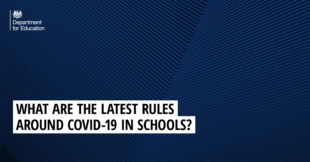
This article was first published on 14 December 2022 and continues to reflect the latest guidance.
Respiratory infections, including the common cold and COVID-19, are common in children and young people, particularly during the winter months. For most children and young people, these illnesses will not be serious, and they will soon recover following rest and plenty of fluids.
Routine testing for Covid-19 ended in April 2022 and UK Health and Security Agency (UKHSA) guidance says that it is not recommended that children and young people are tested for COVID-19 unless directed to by a health professional.
But as the winter months kick in, your child may be showing symptoms that leave you wondering whether they can go to school.
Attending school and college is hugely important for children and young people’s health, wellbeing and their future. Here’s what you need to know.
Can my child go to school if they have Covid-19 symptoms?
As COVID-19 presents a low risk to children and young people, combined with high vaccination rates in the population, there are no longer specific rules relating to it in schools, colleges, childcare and other education settings.
Children and young people with mild symptoms such as a runny nose, sore throat, or slight cough, who are otherwise well, can continue to go to school, college or childcare.
However, those who are unwell and have a high temperature should stay at home and avoid contact with other people where they can. They can go back to school, college or childcare, and resume normal activities when they no longer have a high temperature, and they are well enough to attend.
All children and young people with respiratory symptoms should be encouraged to cover their mouth and nose with a disposable tissue when coughing and/or sneezing and to wash their hands after using or disposing of tissues.
It can be difficult to know when to seek help if your child is unwell. If you are worried about your child, especially if they are aged under 2 years old, then you should seek medical help.
What happens if a staff member or my child tests positive for COVID-19?
UKHSA guidance says that it is not recommended that children and young people are tested for COVID-19 unless directed to by a health professional.
For children and young people aged 18 and under who are recommended to take a COVID-19 test by a health professional and test positive, the advice is to try to stay at home and avoid contact with other people for three days. This is because children and young people tend to be infectious to other people for less time than adults.
Adults are no longer required to do a COVID-19 rapid lateral flow test if they have symptoms. Adults with a positive COVID-19 test result are advised to try to stay at home and avoid contact with other people for five days, which is when they are most infectious.
The UKHSA has also published public health guidance on living safely with respiratory infections, including COVID-19.
What measures should schools be taking to stop the spread?
As well as following the UKHSA guidance signposted, all settings should have in place baseline infection prevention and control measures that will help to manage the spread of infection:
- Reinforcing good hygiene practices such as regular hand washing and cleaning.
- Ensuring occupied spaces are well-ventilated and let fresh air in.
- Ensuring all eligible groups are enabled and supported to take up the offer of national vaccination programmes including COVID-19 and flu
Should schools provide remote education for pupils who have COVID-19?
Schools should consider remote learning for pupils who have been advised to test for COVID-19 by a health professional and have tested positive, but feel well enough to learn and are following advice to stay at home to avoid contact with other people for three days.
What is in place to help children catch up if they miss school?
We’ve made nearly £5 billion available to help children and young people to recover from the impact of the pandemic, including over £1 billion for the National Tutoring Programme, which has revolutionised the way targeted support is provided for the children and young people who need it the most.
Over two million courses have started through the programme, including in areas with high proportions of children in receipt of pupil premium funding, such as parts of Yorkshire & the Humber and the North West.